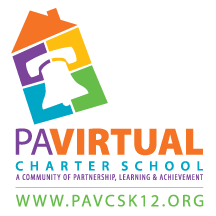Pennsylvania Virtual Charter School
 | |
| Public (services available to any PA citizen) | |
| Industry | Education, Cyber School |
| Founded | 2001 |
| Headquarters | King of Prussia, PA |
Number of employees | 210 |
| Website | www.pavcsk12.org |
The Pennsylvania Virtual Charter School (PAVCS) is a public virtual charter school. According to its website, PAVCS has roughly 4,000 enrolled students.[1] Cyber charter schools enroll many homeschooled students[2] and also children with special needs,[3] who are taught remotely via computer.[4]
Background
PAVCS was approved by the Pennsylvania Department of Education (PDE) in 2001 and then renewed in 2005 for an additional five years.[1] Initially serving kindergarten through 2nd grade,[3] as of 2009, it serves kindergarten through 12th grade.[1]
Governance
Originally chartered by Norristown Area School District,[5] the Pennsylvania Department of Education (PDE) now serves as PAVCS' charter authorizer and monitors PAVCS' compliance with the stipulations of its charter.[1]
The PA Virtual is funded by state tax dollars and governed by Pennsylvania public school, charter school, cyber charter school, and applicable local, state, and federal laws. The school's initial charter was from September 2001 to June 30, 2006[6] was granted by the Norristown School District.[6][7] The charter was then renewed for a period of five years, from July 1, 2006 to June 30, 2011.[5] Since the renewal of the school's charter in 2006,[8] the PDE serves as the school's charter authorizer, monitoring PA Virtual’s compliance with the stipulations of its charter. The school's current charter is for a period of five years from July 1, 2011 to June 30, 2016.[9][10]
PA Virtual has a Board of Trustees (BOT) which provides oversight for PA Virtual and acts in trust for the tax payers of the Commonwealth of Pennsylvania. The role of the Board of Trustees is to:
- develop policies to ensure the school operates in compliance with applicable local, state, and federal laws;
- set goals for and monitor student achievement;
- provide fiduciary oversight of the school's administration and accounting of public funds;
- administer and monitor all contracts. Board meetings are open to the public and members of the PA Virtual community are encouraged to attend.[11][12]
Funding
The school is funded by the state. In 2007, the Pennsylvania state legislature passed a bill that caps the amount of money paid to cyber charter schools based on an average of such schools that achieved academic standards in 2006-2007.[2][4][13] Both sides of the controversy have paid hundreds of thousands of dollars lobbying for or against passage.[4] The Pennsylvania State Education Association (PSEA) retains about six lobbyists, each making between $90,000 and $160,000 a year, while school choice proponents have spent $250,000 lobbying against the bill.[4]
A spokesman for PAVCS said, "If we're not funded properly, and you take away our teachers, we're not going to be able to operate."[2]
References
- 1 2 3 4 "Pennsylvania Virtual Charter School website". Pennsylvania Virtual Charter School. Retrieved 2007-12-31.
- 1 2 3 Wallace, Brian (December 6, 2007). "Bill would limit cybercharter schools". Intelligencer Journal. Retrieved 2007-12-31.
- 1 2 "Pennsylvania Virtual Charter School" (PDF). KPMG. October 30, 2001. Retrieved 2007-12-21.
- 1 2 3 4 Vasoli, Bradley (December 11, 2007). "Legislators Seek 'Accountability' For Cyber Charters". The Bulletin. Retrieved 2008-01-01.
- 1 2 "Charter Annual Review" (PDF). Pennsylvania Department of Education. October 9, 2007. pp. 1–2. Retrieved 2007-12-31.
- 1 2 http://www.pavcsk12.org/download/charters/Charter_2001-02.pdf
- ↑ http://www.pavcsk12.org/download/charters/Charter_Application.pdf
- ↑ http://www.pavcsk12.org/download/charters/Charter_2006-09.pdf
- ↑ http://www.pavcsk12.org/download/charters/Charter_Renewal-2011.pdf
- ↑ Accountability and School Charter
- ↑ About Us: Governance
- ↑ About Us: Accountability and School Charter
- ↑ Smith, Craig (December 5, 2007). "House panel weighs flat rate cyber tuition". Pittsburgh Tribune-Review. Archived from the original on 2 December 2013. Retrieved 2007-12-31.